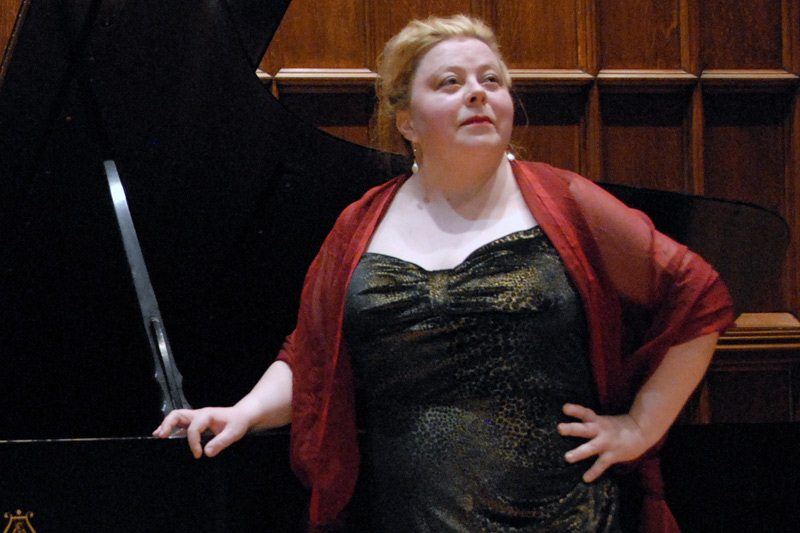Some years ago, during leaner times, the soprano Lisa Daehlin worked for a yarn store, repairing knitted fabric that customers brought in. It wasn’t always fun — sweater armpits, for example, offer a unique fusing of liquid and fiber — but there were other compensations.
“Boy, do you learn a lot when you have to find yarn that matches something that’s 40 years old,” says Daehlin (M.A. ’12), Academic Secretary in the Department of International & Transcultural Studies. “We live in such a disposable society. If there’s a hole in the fabric, we throw it out. So, if someone chooses to repair a 40-year-old piece of knitting, it’s because it means something to them. It might have been made by their grandmother’s hands.”
Daehlin brings that same sense of reverence to her weekly #LovePeopleBeKind Cabaret on TC’s Come Together, Right Now…Virtually site. The show, which she performs in her living room at 6 p.m. on Thursday evenings, is a mélange of self-accompanied singing (“I’m not a pianist — I just play one on TV”), readings (the fare ranges from Maxine Greene to haikus by Daehlin’s friend, Margaret Scanlon, Academic Secretary in TC’s Department of Arts & Humanities), self-deprecating humor (“You know — make people laugh at you before they laugh at you for the thing you don’t want them to laugh at you for”) and spontaneous riffs in which Daehlin often morphs from pixie-ish and Midwestern polite to her big voice in a New York moment.
If someone chooses to repair a 40-year-old piece of knitting, it’s because it means something to them. It might have been made by their grandmother’s hands.
—Lisa Daehlin
Above all, though, Daehlin offers her audience a gentle space in which to slow down, forget their cares for an hour and appreciate some of life’s subtler offerings. Her living room is festooned with many of her own knitted creations, including the red hearts she crochets and gives away to friends, colleagues and chance acquaintances. After opening with the LovePeopleBeKind theme song, penned for her by her friend, the New York City composer Stefania de Kenessey, she’ll greet friends and family as they tune in via chat function. (“Hi, Mom! Here’s that Kurt Weill song I told you about!”) Various books and props are at the ready, and she will likely be sipping tea from a mug inscribed in Hadelansk, a dialect from a region of Norway where there is a farm called Dæhlin. And she’ll reflect on what she’s singing, whether it’s the concluding work from Edvard Grieg’s song cycle “Haugtussa” (“The Mountain Maid”), “Lost in the Stars” by Weill and Maxwell Anderson, or “Imagination,” by Johnny Burke and Jimmy Van Heusen.
April 2, 2020 performance
“In songs of that time, there’s often a male verse and a female verse — the boy sings, the girl sings, they fall in love, everything’s great. Yeah, right,” she said in a recent interview, conducted online, as she leafed through sheet music to “Look for the Silver Lining” (lyrics: Buddy de Sylva; music: Jerome Kern). “So, the boy sings:
Please don't be offended if I preach to you awhile,
Tears are out of place in eyes that were meant to smile.
And the girl sings:
As I wash my dishes, I'll be following your plan,
Till I see the brightness in ev’ry pot and pan.
“God — the power imbalance!” She laughed, shaking her head. “You know, we tend to only remember the refrains, but it’s the verses that hold the story.” She paged backward to “Fly Me to the Moon” (music and lyrics by the pianist and cabaret composer Bart Howard) and sang:
Poets often use many words to say a simple thing
It takes thought and time and rhyme to make a poem sing
With music and words I’ve been playing
For you I’ve written a song
To be sure you know what I’m saying
I’ll translate as I go along
“Wow.” She sat still for a moment, letting the words resonate. “It’s great stuff, but it’s been thrown away!”
Prairie Roots
In the “backwater Northern Minnesota town” where Daehlin grew up, her family threw away nothing — including the piano they rescued from a flooded church basement.
“This was pre-internet, and we had no library, and the TV, which had tin foil on the antennae, only got four channels, so we made our own fun.”
Her father was a pastor and her mother, a school teacher, pianist, organist and some-time choir director.
“That used to be a package deal, you know. Think of the rules now — you can be nine months pregnant, and in an interview, they can’t say, ‘Oh, um…’ But when I was in high school, and the neighboring town was looking for a pastor, it was, ‘And does your wife play the piano?’ So I grew up singing solos in church and on Christmas we kids would do a program at home — someone reads the Bible passage, someone sings. And I’m the baby of five siblings, so it was ‘I want attention and I’m a Sagittarius – people: love me! (please…)’”

PROPS AT THE READY Daehlin performs at Cornelia Street Café in 2016. (Photo courtesy of Lisa Daehlin)
Her mother exposed her to a lot of music through a sheet music collection that consisted largely of selections from the Great American Songbook — popular songs written for Broadway and Hollywood throughout the first half of the 20th century, “mostly by immigrants who fled Nazi Germany for the U.S.,” says Daehlin, whose own family began arriving “in waves” from Norway beginning around 1850. “People like Erich Korngold [the Austrian-born conductor and composer who wrote scores for Captain Blood, The Adventures of Robin Hood, The Sea Wolf and other films], who lifted from himself for film scores. Our country has a huge ear for this stuff. And it’s such a joy to sing.”
Bright Lights
Daehlin has sung in numerous operatic roles, given concerts in Italy, Germany and Scandinavia, and performed frequently at St. Paul's Chapel, The Players Club and the Cornelia Street Café (now closed) — but there were times, when she first came to New York City (“to pursue my dream, whatever that was”) when her path seemed less clear.
“It’s hard to be a classical singer. It takes so much money. You have to pay a $50 application fee just to walk in the door for an audition, pay your pianist, and take the day off from your job — so you’re out a couple hundred bucks when it’s all said and done, and all just to get a letter saying ‘you’re one of the 5,000 sopranos we’ve heard, and maybe if you’d been a tenor.’ Hmm — why am I going on about that? I guess, because it still hurts.”
My biggest fear at this point is that I’m going to start spilling my guts as though I were talking to a therapist. Or say something bad — Mom’s watching! — or, God forbid, that anyone will see the mess I shoved into the other corners of the room.
—Lisa Daehlin
She has found it challenging, on occasion, to navigate her various artistic identities — like the time when a composer said, “Don’t take this as an insult, but is your voice meant to be heard at more of a distance?”
“He was right, of course — I’m an opera singer, and opera singers aren’t meant to be heard from a foot away. It’s more like a pointillistic picture. Up close, it can overwhelm, but when you see it from further away — not, like, from New Jersey, but in a big space — you can take it in. So, I’ve had to learn to modify my voice for cabaret and other settings.”
Or the time when she auditioned for someone connected to the Met’s Young Artists’ program, and her voice teacher, who had given the director one of Daehlin’s designs as a holiday gift, told her not to mention that she was the knitter.
April 9, 2020 performance
“She said, ‘Because then she’ll see you as a fiber artist,’” Daehlin recalls, making quotation marks in the air.
But eventually things changed. In 2013, Daehlin, who also runs a business called “Hats de Lisa,” created a show she called “Twisted Stitch: Songs of Love and Knitting,” in part just to thumb her nose at convention. Nowadays, she pretty much sings what she wants to sing (Poulenc, Satie), when she wants to.
“There’s a Venn diagram, and I’m in the middle of it,” she says. “These are the buckets of my life. I’m more than that, I hope, but maybe it’s package-able.”
The “#LovePeopleBeKind Cabaret” is just one of her incarnations, but it may be, figuratively as well as literally, closest to home. After a somewhat discombobulated launch (“I was moving furniture around the apartment, unearthing the keyboard, cleaning up a corner to make into a stage and to show to the world, and then, exhausted, realized, ‘Ok, now it’s time to do the show!”), she now effortlessly navigates off-screen costume changes, pre-recorded accompaniment by still other friends and musical colleagues Sonja Thompson and Ellen Mandel, and in general conjures the feeling that you are right there in the room with her.
Doing cabaret this way really opens up the reality of singing in the shower or a lullaby for yourself. It’s what’s comfortable for your body — and if it’s comfortable for you to sing, chances are it is for someone else to hear as well.
—Lisa Daehlin
“Doing cabaret this way really opens up the reality of singing in the shower or a lullaby for yourself,” she says. “It’s what’s comfortable for your body — and if it’s comfortable for you to sing, chances are it is for someone else to hear as well. Really, my biggest fear at this point is that I’m going to start spilling my guts as though I were talking to a therapist. Or say something bad — Mom’s watching! — or, God forbid, that anyone will see the mess I shoved into the other corners of the room.”
The show also reflects a certain measure of serendipity and maybe even fate. Daehlin’s grandmother, who attended St. Olaf College in 1918 by selling her inheritance (an acre of the family farm), later served as President of the Northern Minnesota Women’s Missionary Federation and Secretary of the National Cradle Roll, a church organization that welcomed newborns into the religious fold.
“A few years ago, my mom told me that, in one of those capacities, she traveled around holding meetings at which she sang and gave interpretive readings. And I’m so glad to know that. Not to get all mystical about it, but I do believe that some things happen for a reason. I’ve done a million live cabaret shows, and I was planning to do a few more this year, but they’re expensive. Now I’m doing them every week out of my living room.” She shrugs and smiles. “Never saw that coming!”

